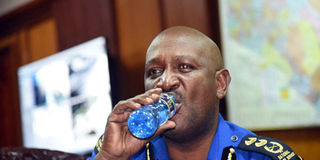Mutyambai's traffic rules for VIPs can't be enforced: MPs

Inspector-General of Police Hilary Mutyambai during an interview at his Jogoo House office in Nairobi on April 26, 2019. PHOTO | EVANS HABIL | NATION MEDIA GROUP
What you need to know:
- Dan Maanzo (Makueni) and Godfrey Osotsi (nominated) said Mr Mutyambai overstretched his mandate by “purporting” to make laws in contravention with section 119 of the Traffic Act.
- The rules must, however, be published and brought to the National Assembly for consideration by the Delegated Legislation committee and be approved by the House in line with the Statutory Instruments Act before they are implemented.
- The House legal department said it was studying the directive with the possibility of recommending that Mr Mutyambai be summoned for questioning by the legislators.
- Mr Maanzo, a member of the Delegated Legislation committee, further noted that any rules brought to the House must undergo public participation before they are implemented.
Members of Parliament have faulted the directive by Inspector-General of Police Hilary Mutyambai on road clearance for VIPs saying it is not enforceable because it lacks the requisite force of the Traffic Act.
Dan Maanzo (Makueni) and Godfrey Osotsi (nominated) said Mr Mutyambai overstretched his mandate by “purporting” to make laws in contravention with section 119 of the Traffic Act.
The law provides that only the Cabinet Secretary responsible, the one in charge of the Interior ministry in this case, makes the rules.
The rules must, however, be published and brought to the National Assembly for consideration by the Delegated Legislation committee and be approved by the House in line with the Statutory Instruments Act before they are implemented.
“No authority other than Parliament has the power to make laws. The IG must be living in the past,” Mr Maanzo said.
The House legal department said it was studying the directive with the possibility of recommending that Mr Mutyambai be summoned for questioning by the legislators.
PUBLIC'S VIEWS
Mr Maanzo, a member of the Delegated Legislation committee, further noted that any rules brought to the House must undergo public participation before they are implemented.
Mr Osotsi noted that the Traffic Act only recognises the President, ambulances, fire brigade and police cars on special assignment as those to be accorded special clearance by traffic police.
Effecting the IG’s guidelines would therefore require an amendment to the Traffic Act.
“No proclamation or circular has any force of law and public participation is important. The IG has not quoted any law to back up his circular, that it [cannot be implemented],” said Mr Osotsi.
THE VIPs
Mr Mutyambai said five categories of Very Important Persons will have the road clearance privilege.
Category one has the President, Deputy President, First Lady, Chief Justice, Attorney-General, Defence, Interior, Finance and Foreign Affairs Cabinet Secretaries, and Interior, Defence, Finance and Foreign Affairs Principal Secretaries.
The Chief of Defence Forces, Service Commanders of Defence Forces, Inspector-General of the National Police Service, Deputy Inspector-General of the Kenya Police Service and the Deputy Inspector-General of the Administration Police Service are in category two.
In category three are the National Assembly and Senate Speakers and Majority Leaders.
Category four has retired presidents and the retired Prime Minister while category five covers ambulances and the fire brigade.
WARNING
According to the IG, the guidelines are meant to streamline traffic flow in major cities.
Mr Mutyambai said that under special circumstances, any other vehicles will require the authority of traffic officers in specific regions.
“All other vehicles, including government registered ones, are expected to follow the normal traffic flow. Any government vehicle found violating traffic regulations especially those overlapping, the drivers shall be arrested and charged in accordance to the law,” he warned.





